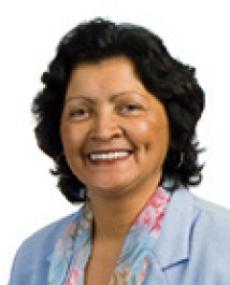
Virginia Engel was born on 27 April 1950 in Cape Town. She married Desmond Engel and they have three daughters, Tania, Kim and Liza. Her exposure to apartheid injustices and economic exploitation as a child influenced her to take part in the struggle. Primary and High School teachers also instilled a desire to resist and fight the inhuman system in her.
She first became involved in politics at Livingstone High School , where several of her teachers were involved in the Unity Movement and the Anti-Coloured Affairs Department (Anti-CAD) activities. Some of these teachers were arrested and imprisoned or transferred to rural areas. As a young High School student she participated in school boycotts by protesting against the Special Branch's action against teachers.
She joined the National Union of South African Students (NUSAS) in 1971 and attended a conference at Natal University. This conference introduced her to people like Steve Biko and Barney Pityana, and organisations like the South African Students' Organisation (SASO). This organisation had a major impact on her life because she began to understand her feelings of inferiority in the presence of Whites. SASO became a home to her because it was a breakaway organisation of black students who believed in the Black Consciousness philosophy. This led her to equally accept herself and others.
Virginia was elected as the first Western Cape SASO Treasurer, but after the Executive Members of the group were arrested or instructed to go to the Caledon Square offices of the Special Branch. The security police, specifically Spyker van Wyk, threatened the activists' parents at their homes. This was her first encounter with the Special Branch. At the Caledon Square offices she saw that Johnny Issel and Ben Palmer. The police officers tried to "warn" her about these terrible characters that she was associating with and how her "decent" family would be very disappointed in her involvement with all those "kaffirs".
In 1972, she and other activists went to King William's Town to meet with other SASO members in order to strategise for the way forward. They brought back a bakkie full of SASO booklets. This was a major event because this was the first booklet that explained what SASO stood for and it had to be used to win members for the organisation.
Virginia held several different positions in various organisations. She was a Western Cape BPC delegate and attended a clinic facilitated by Dr. Ramphela Mamphele, a FCWU Organiser and Secretary of the Cape Town Branch and NUTW Regional Secretary for the Western Cape. She also took part in multiple labour campaigns like the Fattis and Monis workers' strike and boycott campaign and the anti-South African Indian Council (SAIC) campaign. She was also instrumental in the formation of the United Women's Organisation (UWO) and was a speaker at their rally at the Athlone Civic Centre. She arranged the funeral of Hennie Ferus in Worcester, which, along with the anti-SAIC campaign, brought a great deal of public exposure to the African National Congress (ANC).
Virginia was detained, with other activists, in Pollsmoor Prison shortly after first state of emergency was announced. She was fortunate in that she had links with overseas organisations and these organisations rallied for her release. The factory workers also demanded her release and she was freed three days later. On her release, a security police officer drove her home and she thought that she was being taken in for interrogation.